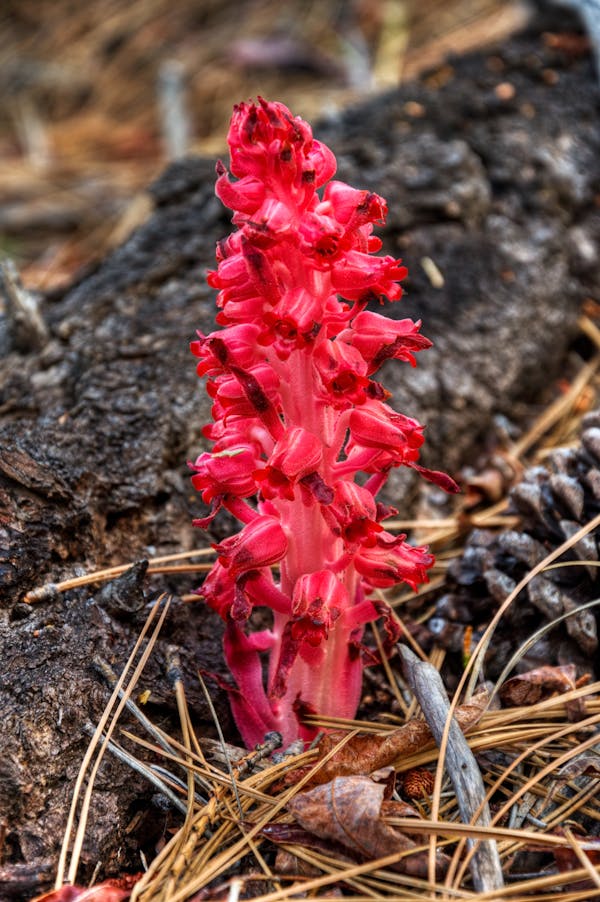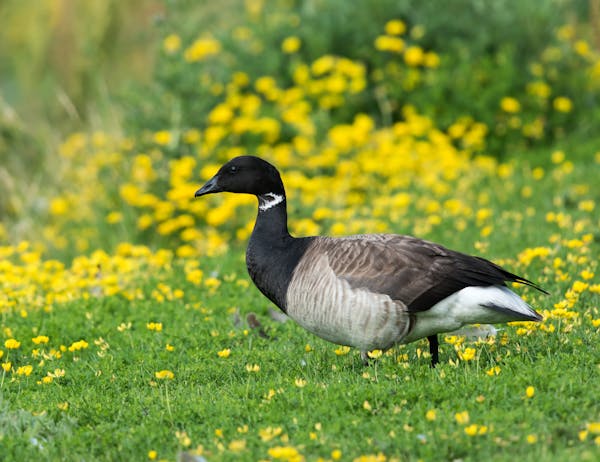Just like us, the natural world dances to the rhythms of its seasonal cycles. We all enjoy the first suggestions of spring as trees come into leaf, migrant birds arrive, bees and butterflies emerge, and men in cities start wearing shorts.
These signs traditionally mark the start of a busy season of growth and reproduction for many species. But climate breakdown is altering the timing of many of the natural world’s seasonal cues. This is knocking different elements of the living planet out of sync with each other, with potentially disastrous consequences for ecosystems.
Spring is arriving earlier throughout the world’s temperate and polar regions, but the species that live there are responding differently to the season’s advance. This happens because they use different cues, which respond to climate breakdown in different ways, if at all.

Sarcodes sanguinea, commonly called the snow plant, flowers after the northwest American spring snow melts. Jeffrey T. Kreulen
For example, some species may react to the temperature reaching a minimum threshold or the melting of the last snow, cues that are happening earlier as global temperatures rise and unseasonable heatwaves become more common. However, others respond to day length, which is unaffected by climate breakdown.
As the timings of age-old seasonal cues diverge with climate breakdown, some species are already starting to breed at different times relative to others they interact with, such as their prey. This can disrupt interactions that are critical to their life cycles. It’s a growing problem known as “phenological mismatch”.
Take, for example, the birds of European oak woods, such as the blue tit, great tit and pied flycatcher. They all depend on caterpillars to feed their chicks, but the caterpillars are emerging earlier than they have in the past, and the birds are unable to keep up. For every ten-day advance in caterpillar emergence, the birds are only able to bring forward their egg laying by three to five days, depending on the species.
As a result, bird appetites are greatest after the period of peak caterpillar availability, and this reduces their reproductive success. In the Netherlands, this has caused pied flycatcher populations to crash by over 90%.
Such mismatches may be most pronounced towards the poles, where temperatures are rising much faster than the global average. In the tundra of Greenland, the date on which insects are at their most abundant has been advancing by over a day a year since the mid 1990s. However, the hatching dates of the sanderling, a small shorebird, remain unchanged.
The birds can’t breed earlier because that would increase the chance of losing their eggs to Arctic foxes. After two decades of unequal shifting in the food chain, the main banquet is already over when sanderling chicks are born, though more research is needed to understand how this is affecting their population.
Mismatches aren’t limited to predator-prey interactions. They can also affect age-old partnerships between plants and their pollinators. The early spider-orchid vaguely resembles the female of the buffish mining bee and, like the closely related bee orchid, releases pheromones to trick the male bees into mating with it. In doing so, the bees inadvertently pollinate the flower.
https://youtu.be/GV0oLYLgSJs
Orchid flowering is timed to coincide with the brief window between male and female bees emerging, so the males have nothing to mate with but flowers. But in warmer springs, the earlier emergence of females cuts this window, probably reducing the number of bees visiting and pollinating these orchids. Given the importance of insect pollination to agriculture and the functioning of ecosystems, the potential for such mismatches should be great cause for concern.
Cascading concerns
Perhaps more worrying still, the impacts of these asynchronies are not confined to the species directly involved: they may cascade right through an ecosystem. For example, mismatches between birds and caterpillars may not only be bad for the birds. Now less likely to be hunted in their early lives, caterpillars can significantly reduce a tree’s foliage, and this could have knock-on effects for other insect herbivores that graze them, and in turn the animals that feed on these insects.

A black brant forages on grass. FotoRequest/Shutterstock
Research on such ecosystem impacts is still in its infancy, but experiments in Alaska suggest that they could even contribute to climate feedbacks – processes that amplify global heating. There, the early return from migration of the Pacific black brant (a wild goose) means that the plants it feeds on lose more mass. While the change is good for the goose, it turns the ecosystem from a net absorber of carbon to a net emitter, exacerbating climate breakdown.
There is much we still don’t understand about climate breakdown’s impacts on our fragile nature, and phenological mismatches are particularly complex to study. But what’s clear is that species and ecosystems, already weakened by habitat destruction, overharvesting, invasive species and pollution, face a major new threat.
If we are to have any chance of preserving the living planet and avoiding the extinction of a million species, then we need to do more than stop climate breakdown. We need to invest in conservation too, to help wild plants and animals adapt to the changes we’ve already locked in. Not doing so would be bad news for all of us.
https://theconversation.com/climate-bre ... ied-123892


